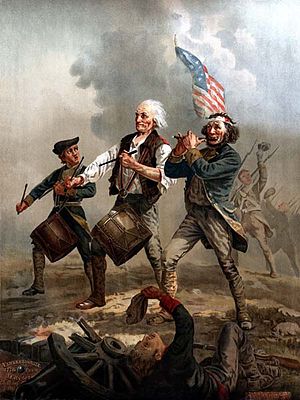Word History of the Week: Yankee Pt 2
Welcome to Yankee post part two! I wasn’t able to post this last week, and for that I apologize but I have that I can make up it up to you with this poem cited to be by E. B. White.
To foreigners, a Yankee is an American.
To Americans, a Yankee is a Northerner.
To Northerners, a Yankee is an Easterner.
To Easterners, a Yankee is a New Englander.
To a New Englanders, a Yankee is a Vermonter
And in Vermont, a Yankee is somebody who eats pie for breakfast.
Alright, so it’s not much of a poem, but this gives you a really good idea of the multitude of meanings that the word yankee has. All the above meanings are completely accurate – it just depends who you are and where you are that will change the meaning. Although, I’m not so sure about that last line; if that’s true, I’d be a yankee every day!
I’m not sure if anyone else thinks it’s as cool as I do (which is true about everything I put on this blog) but I find it fascinating that one words definition changes so easily. The definition of this word is very much dependent on relativism. Relativism in this instance basically means there is no absolute true definition of Yankee – the definition depends on the position of the person using the word. If you wanted to take this further (and I want to) you could almost say this word doesn’t have a definition (or has so many definitions as to be void) without a specific person speaking it, to give it a specific definition.
Okay, I’ll step away from the confusion Inception word machine…
The word yankee certainly does have one overarching meaning when you leave the US of A: it is a derogatory word for Americans. However, at first glance, that’s pretty strange; yankee originated from colonial USA. It makes sense for the word to have crossed the pond to England, and maybe even Spain or France, but would you believe the word is used in Japan, the Philippines, and even Iceland? That’s just a few of a countries that were noted as having used the word, but I’m sure if a poll was done, there are a lot of countries using this word.
And I’m not trying to highlight any anti-american sentiments here, but rather the amazing power of words to travel. The primary reason the word yankee spread was due to the war. Most of the countries noted to use the word had interaction with the USA during World War II or after the war. The Japenese were once called the, “Yankees of the East” for their modernization and industriousness – both of which can easily be attributed to the United State’s interaction with their country after WWII. However, now in Japan, the word yankee is often used to refer to delinquent teen – so the word hasn’t escaped it’s pejorative history even there.
Think about how many other words have made it cross country: computer, internet, meme. Now, it’s not surprising that words cross borders; the internet gives us instant contact and communication with anyone. It makes it even that more amazing that one single word has practically made its way all around the earth and before the internet was even fathomed.
So I leave you with one question, on a positive and less historic note: if there was one word you could spread to other countries, what word would it be?











So interesting, I never knew that Yankee meant so many different things to different people! Umm word that I want to give to other countries… let’s find a nice french one… um a phrase – T’es à la ramasse- You’re behind the times… sorta
Interesting 😀 I’m a New England Yankee.
“Yankee” (yankii, ヤンキー) is also used in Japanese slang to mean a young “delinquent,” but it also has a more lighthearted feeling to it, and can be used playfully the way we say someone is “gangster/gangsta” in English.